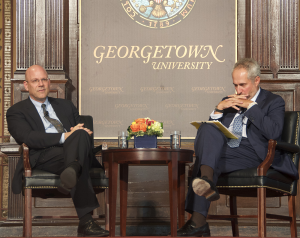
SFS Dean Joel Hellman spoke at the first event of the second iteration of the series, alongside Stéphane Dujarric (SFS ’88).
School of Foreign Service Dean Joel Hellman made his first public appearance Wednesday at the inauguration of the second semester of the Global Futures Initiative lecture series in Gaston Hall.
Hellman spoke on overcoming governance issues, and his speech was followed by a discussion with Stéphane Dujarric (SFS ’88), spokesperson for United Nations Secretary-General Ban Ki-moon.
The event, entitled “Challenges to Global Governance,” ushered in this semester’s series topic — the global future of governance.
Vice President for Global Engagement Thomas Banchoff, who leads the Global Futures Initiative, introduced the mission of the event.
“We had two goals: to introduce Dean Hellman to the SFS and the wider university community and also kick off the second semester of the Global Futures Initiative,” Banchoff said.
The major focus of Hellman’s remarks was the issue of development within the world’s “fragile states” — defined as such because of the lack of objective standards of institutional quality and the presence of peacekeeping forces or conflict.
According to Hellman, these 33 nations are spread across four continents and include developing countries like Haiti, South Sudan, Afghanistan and Iraq. These countries pose significant challenges to global development as a result of their instability.
“This group of fragile states is really sort of the source of many of the major issues that are affecting us today,” Hellman said.
Hellman addressed many of the specific issues that fragile states now face, including extreme poverty, a smaller share of international development assistance than other developing nations, inadequate local aid distribution architecture, security concerns, institutional inefficiency and corruption.
“Extreme poverty is declining at unprecedented rates,” Hellman said, citing World Bank statistics showing that from 1993 to 2011, global poverty levels fell from 41 to 17 percent. “If we look at governments that we term fragile states, we see that poverty rates there have pretty much stayed stable over a long period of time and in fact even more recently there has been an uptick in poverty rates in the fragile states.”
In general, Hellman said development in fragile states requires new approaches to state-building.
“If we look down at governments [of fragile states], especially local governments, we see that state-building often looks different than our assumptions of what we think it is,” Hellman said. “It is often an empty room, with a single desk, with a single powerful individual who uses individual relationships … lacking … everything that you need to create a state. How do you build a state in that kind of environment?”
In order to address these issues, Hellman suggested that he would like Georgetown students to examine them in their studies.
“We need to fundamentally rethink these issues,” Hellman said.
“Georgetown offers the opportunity at its School of Foreign Service in particular … to really rethink these issues in a different way.”
Hellman also noted that Georgetown’s connection to a global Jesuit network of relief services and universities — many of which exist in fragile states — could be leveraged to combat issues of global governance.
“We also have one other advantage here at Georgetown that I want to think very seriously about, which is our Jesuit values, of course, but also the Jesuit organizational network,” Hellman said.
Dujarric also noted Georgetown’s ability to combat international issues of governance.
“I think that a school like Georgetown has a role to play in training people differently, in producing different types of graduates who then go into the international world, into development aid,” Dujarric said.
The event concluded with a question-and-answer session with the audience and students watching live from the Qatar campus.
Teresa Eder (SFS ’17) said that attending the event changed her view of the state of global affairs.
“The event shifted my focus to the fact that fragile states are the ones we have to focus on if we are talking about future development policies,” Eder said.
Tsai Chih Tang (SCS ’16), a student in the Business Professional English program, said the event may guide his future aspirations.
“[The event] did affect my viewpoint in a way that it gives me the thought of devoting myself to international humanitarian operations in the future,” Tsai said.




















